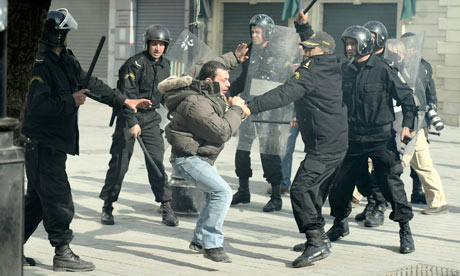Demonstrators urge ruling party to give up power as interim leaders prepare to announce a government
- guardian.co.uk,
- Article history

Tunisian security forces used teargas, water cannon and warning shots to try to break up a crowd that gathered in the centre of Tunis this morning to demand that the ruling party give up power.
About 2,000 people assembled on the capital's main boulevard in a protest against the RCD party, chanting: "Out with the RCD" and, "Out with the party of the dictatorship".
The demonstration comes as Tunisia's interim leaders prepare to announce a new, national unity government in an attempt to calm tensions after days of violence followed the fall of the president, Zine al-Abidine Ben Ali.
There have also been unconfirmed reports that the gunmen behind the shooting rampages that came in the wake of Ben Ali's escape to Saudi Arabia on Friday have been arrested or killed.
In an unprecedented transition of power in the Arab world, the Tunisian prime minister, Mohamed Ghannouchi – a longtime ally of Ben Ali – has said the new government will include former regime opponents long locked out of access to power.
Many Tunisians are hopeful about their first new government in 23 years but wary of what the future may hold. Some countries – including Tunisia's former colonial ruler, France – have called for restraint as unrest in the north African country plays out.
Although riot police used violence to disperse the protesters, a semblance of normal daily life returned in some areas of the capital today, with once-shuttered shops, petrol stations, pharmacies and supermarkets reopening and many people returning to their jobs.
Hundreds of stranded tourists were still being evacuated from the country. Foreign airlines were gradually resuming services that were halted when Tunisian airspace closed amid the upheaval.
The constitution requires elections within 60 days of the departure of a leader, but one opposition leader said the Tunisian authorities could instead announce presidential elections in the next six months.
The opposition PDP party has pushed for the later timetable, arguing that Tunisians need time to familiarise themselves with parties so that elections can be credible after decades of one-party rule.
Nejib Chebbi, the longtime leader of the PDP, and two other leaders of opposition parties are expected to gain posts in the new government along with some members of Ben Ali's former regime, according to a party official.
Moncef Marzouki, a professor of medicine who leads the once-banned CPR party from exile in France, where he has lived for the past 20 years, told France-Info radio he would be a candidate in the presidential election.
"The question is whether there will be or won't be free and fair elections," said Marzouki, whose movement is of the secular left.
The new government's first task will be restoring order. A month of street protests against the years of repression, corruption and a lack of jobs for Tunisia's well-educated youths brought down Ben Ali, and looting, gun battles and score-settling have followed.
Over the weekend, police arrested dozens of people – including the top presidential security chief – as tensions appeared to mount between Tunisians delighted at Ben Ali's departure and loyalists fearful of losing their perks.
Looting escalated as ordinary Tunisians saw worsening shortages of essentials such as milk, bread and fish.
A gun battle also broke out around the presidential palace, in Carthage, on Sunday afternoon. The army and members of the newly appointed presidential guard fought off attacks from militias loyal to Ben Ali, according to a member of the new presidential guard. Another two-hour gun battle behind the interior ministry in central Tunis raged at the same time.
The prime minister said the police and the army had arrested members of the armed groups but would not reveal how many had been caught.
"We won't be tolerant towards these people," said Ghannouchi, adding: "The coming days will show who is behind them."
The former presidential security chief Ali Seriati and his deputy were charged with a plot against state security, aggressive acts and "provoking disorder, murder and pillaging", the TAP state news agency reported.
The downfall of the 74-year-old Ben Ali, who took power in a bloodless coup in 1987, served as a warning to other autocratic leaders in the Arab world.
The Mediterranean nation, a supporter of the US anti-terrorism policy and a popular tourist destination known for its wide beaches, deserts and ancient ruins, had seemed more stable than many in the region before the uprising that began last month.
No comments:
Post a Comment